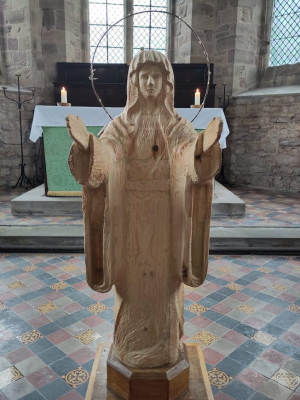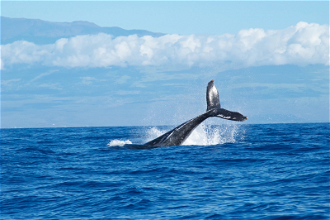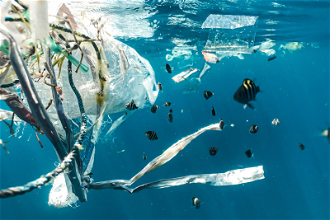Mission to value the Ocean

Our Lady of the Waters at St Mary's, Hay-on-Wye
I noticed a call out this week on social media for ocean visuals. The photo illustrating the website showed fishing from a small boat in Greenland amidst icebergs…. beautiful. But I wonder how many of the images coming in will be as lovely.
This summer has seen sea and beaches along Britain's coastline contaminated by untreated and foul sewage. Holidaymakers on some of our most popular beaches in the south were warned to stay out of the sea because of the risks to health from swimming with faeces and God knows what else! Heavy rain overwhelmed sewer systems, leading water companies to release sewage into the natural environment. And there doesn't seem to be anything illegal about this. Surfers Against Sewage branded a map of the country dotted with sewage hotspots a "horrifying sight".
And we know the scale of what happened and why largely because of former singer turned environment campaigner Feargal Sharkey who says water companies pumping raw sewage into our beaches is the "physical manifestation of 30 years of profiteering". He points out that water companies are failing to monitor the amount of sewage being pumped into the sea because their systems are faulty or non-existent. They have been investing in shareholders and not in infrastructure for years.
Last year, 256 Tory MPs voted with the government to reject an attempt by the House of Lords to bolster the Environment Bill. Peers wanted to force water companies and the government to demonstrate progressive reductions in discharges of untreated sewage and make it standard for them to "take all reasonable steps" to avoid using combined sewer overflows. They lost - as did all civil society, from bathers to consumers of seafood.
Boris Johnson's own father blamed the government for water pollution because the post Brexit reality of reduced EU oversight has weakened environmental protections. Stanley Johnson, the 82-year-old former Conservative MEP, suggested that Brexit meant his son's administration felt unable to push to stop the pollution as strongly as it might have were the UK still part of the EU.
But the lack of respect for the planet's oceans - or should we say ocean? - is a phenomenon seen across the world, according to the Columban Missionary Society. Eco-theologian Sean McDonagh has described the damage that we have done to the ocean as "absolutely horrendous." One example is the destruction of phytoplankton. "People talk about the Amazon and the forests of Central Africa as being the lungs of the world," he says, "but the lungs of the world are phytoplankton; scientists estimate that phytoplankton contribute over 50% of the oxygen in Earth's atmosphere."
Seven years ago, the Columbans in Korea hosted a symposium, 'The Ocean and Theology'. They explored the important but neglected issue of: 'The ocean and our relationship with it.' It was a relatively new theme within the world of mission, even though Laudato Si' came out the same year. The symposium highlighted the reality that the ocean has been largely ignored in theological reflection.
It brought together Columbans working in Chile, New Zealand, China, Korea, Brazil, Pakistan, who researched and presented papers on an equally varied number of topics relating to the ocean, trying to make theological and missiological connections. The topics ranged across a broad spectrum of theological and academic areas such as Spirituality, Justice, Peace, Dialogue, Exploitation, Migration, Philosophy, Mythology and Ecology.
Fr Eamon Adams, based in Korea, believed that we need to acquire a sense of wonder at the 'otherness of the ocean'; a much more holistic approach is needed which calls us to recalibrate our relationship with the Ocean. Former Columban Superior General, Fr Tommy Murphy focused on the role and significance of the ocean in early Celtic Monasticism, where the ocean was seen as a place of ascetical practice and also a place of formation. Justice, Peace & Integrity of Creation (JPIC) Coordinator in Chile, Cesar Correa, presented a thesis, 'The Looting of a Common Good: Ocean grabbing in Chile, a perspective from affected communities.' The privatisation of the ocean has been going on for decades, with property rights in ocean fisheries. This new reality is a serious challenge that calls upon missiology to respond.
Fr Pat McMullan, who works in Korea, highlighted the looming dangers of rising sea levels caused by climate change in a process of what he called "de-creation". He felt our theological language is inadequate today in helping us make the dramatic changes in human behaviour which are needed to save this situation. Korea JPIC coordinator, Fr Pat Cunningham, focused on the Environmental Impact of Militarism, Military Installations and Naval Base Construction on the island communities of Jeju (Korea) and Okinawa (Japan).
New Zealander Fr Michael Gormly shared on the contact between Church missionaries and peoples surrounded by the ocean in the south Pacific, which has not always been positive. He saw the need for a greater embracing of 'indigineity' in order to create an Oceanic Spiritual Theology. Fr Liam O'Callaghan works in Pakistan as the Columban JPIC and Inter-Religious Dialogue Coordinator and researched the reasons why the Indus river delta is dying, primarily due to a lack of freshwater, due to the irrigation canals upstream on the Indus. He highlighted how an interfaith approach to this crisis could be part of the solution.
More recently, in June, Archbishop Peter Loy Chong of Fiji told an international Catholic webinar on the ocean that he was concerned about destructive mining. He lamented deep sea mining, and even mining on land where tailings end up in the ocean, and was concerned about the power of money to override any priority to environmental protection. He told of a childhood living close to the ocean and going fishing with his mother to catch shrimps, fish, and eels. "It was like going to the fishmarket for food," he said, "but the sea also provided entertainment and transportation." He called for spiritual and cultural language to tackle the destruction, saying, "what is the language that reaches the hearts of people and brings about change."
So, human activity has polluted water in rivers, lakes and oceans around the world for decades. Oceans are being over-fished and polluted at an unprecedented rate, so that deep water eco-systems are destroyed even before we discover their existence. And the problems cross national boundaries. This week three French Euro MPs accused the UK of neglecting environmental commitments and risking marine life and fishing. The MEPs warned that in the short term the sewage leaks risk bathing waters on the French coast and could also harm marine biodiversity, fishing and shellfish farming.
Well done to the Anglican parish of Hay on Wye who staged a "river pilgrimage" this week to highlight the plight of water and wildlife in the River Wye, which has had to cope with sewage discharges and fertiliser run-off from farms. A wooden statue of Our Lady, by Peter Chatfield, was floated down 75 miles of the Wye from Hay-on-Wye to Monmouth. Church bells were rung and choirs sang as the statue - Our Lady of the Waters and the Wye - passed by, carried by two canoes. "How can you claim to give worth to the invisible if you're not celebrating the worth of that which is very visible and very loved?" Rev Richard Williams of St Mary's Church, Hay-on-Wye told the media. "People love this river and it seems so hideous that people should be allowed to pollute it and spoil it." Of course, the pollution ends up in the Severn Estuary.
We are coming up to the Season of Creation which calls for "ecological conversion". "Our religious tradition should help us to rise to these challenges," says Fr Sean McDonagh. "Water plays a central role in the Bible and in our Christian faith. Preserving and protecting fresh water and the ocean must be seen as part of our Christian responsibility to care for God's Planet Earth."


















